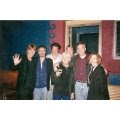
Band: Tower of Power
Title: Great American Soulbook
Rating: 8
Writer: Rick Galusha
Combine one of recorded music finest horns bands with the best of the best soul songs and you get the new Tower of Power album, ‘Great American Soulbook.’ While mass appeal has overtly missed this terrific bay area act, for more than four decades (’68 – present) Tower of Power have graced, albeit surreptitiously, some of radio and recordings most popular acts including; Aerosmith, Elton John, Little Feat, Phish, Santana, Heart, Huey Lewis and the News, the Monkees, Santana, Elkie Brooks, Elton John, John Lee Hooker, Rod Stewart, Jefferson Starship, Mickey Hart, Spyro Gyra, Lyle Lovett, Poison, Phish, Toto, and the Brothers Johnson.
Perhaps the comfort of this album is that there are no surprises. Across their 22 albums the band has been consistent and ranged from brilliant to good. As the title of the album implies, TOP covers twelve well known soul songs including; Billy Paul’s ‘Me and Mrs. Jones,’ a medley of James Brown hits (an early influence on the band’s sound development) and Bill Wither’s ‘Who is He and What is He to You.’ Perhaps the highlight of the album is Tom Jones version of Sam & Dave’s, ‘Thank-you’ (as covered earlier by Z.Z. Top). Other guest appearances include; Sam Moore’s (Sam & Dave) cover of the Otis Redding hit, ‘Mr. Pitiful, ’ two songs with British youngster Joss Stone who joins the band for, ‘It Takes Two’ and ‘Your Precious Love’ and the aforementioned Huey Lewis on, ‘634-5789.’
Any song on this album is immediately radio friendly and music fans will find the performances and singing to be excellent. No, TOP is not breaking any new ground with this release but perhaps seeing the rewards that Rod Stewart and others had using well known covers to find financial success, Tower of Power has fallen back on their early influences and personal favorites to release an album that most soul music fans and many blues fans will find hours of enjoyment listening to.
















